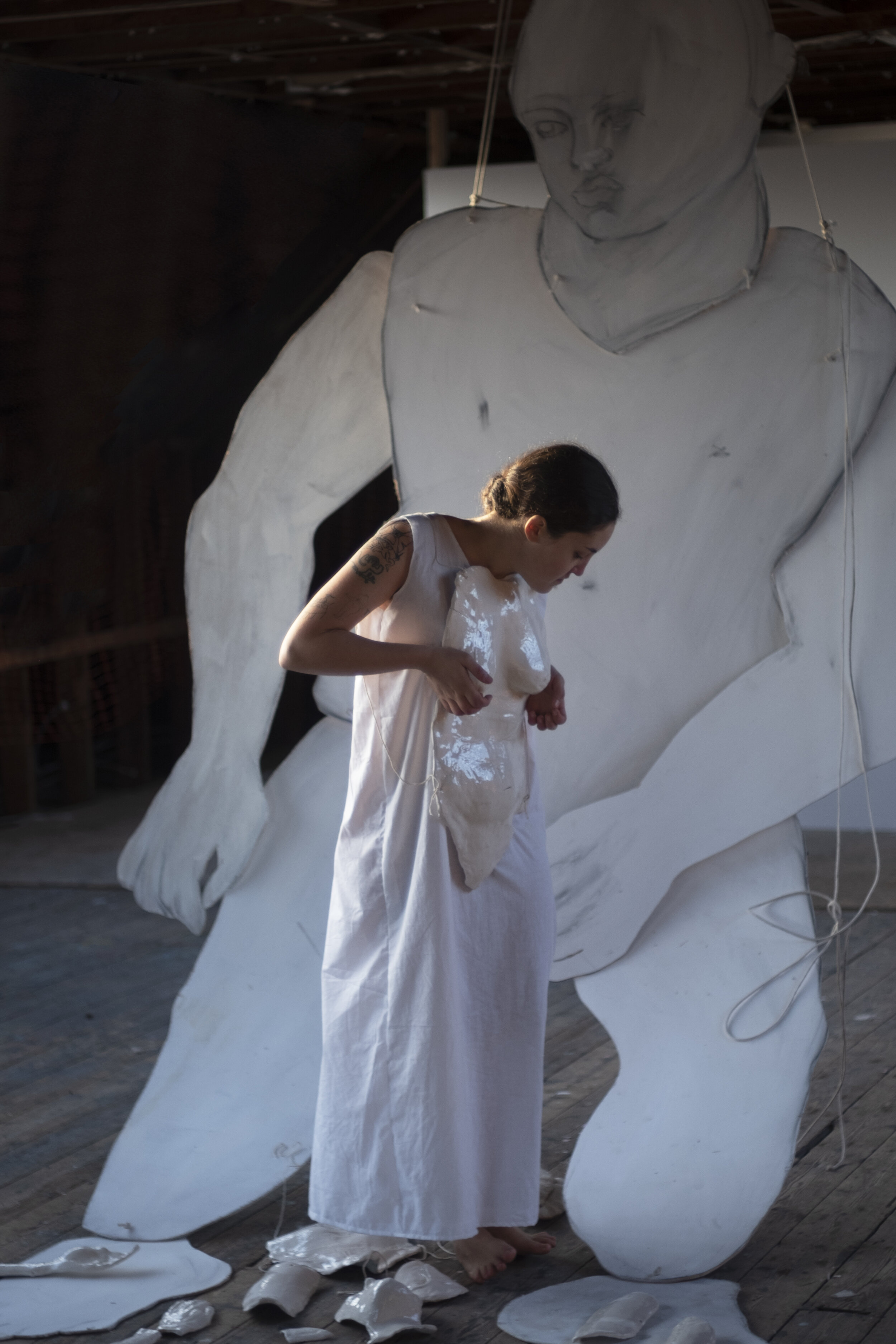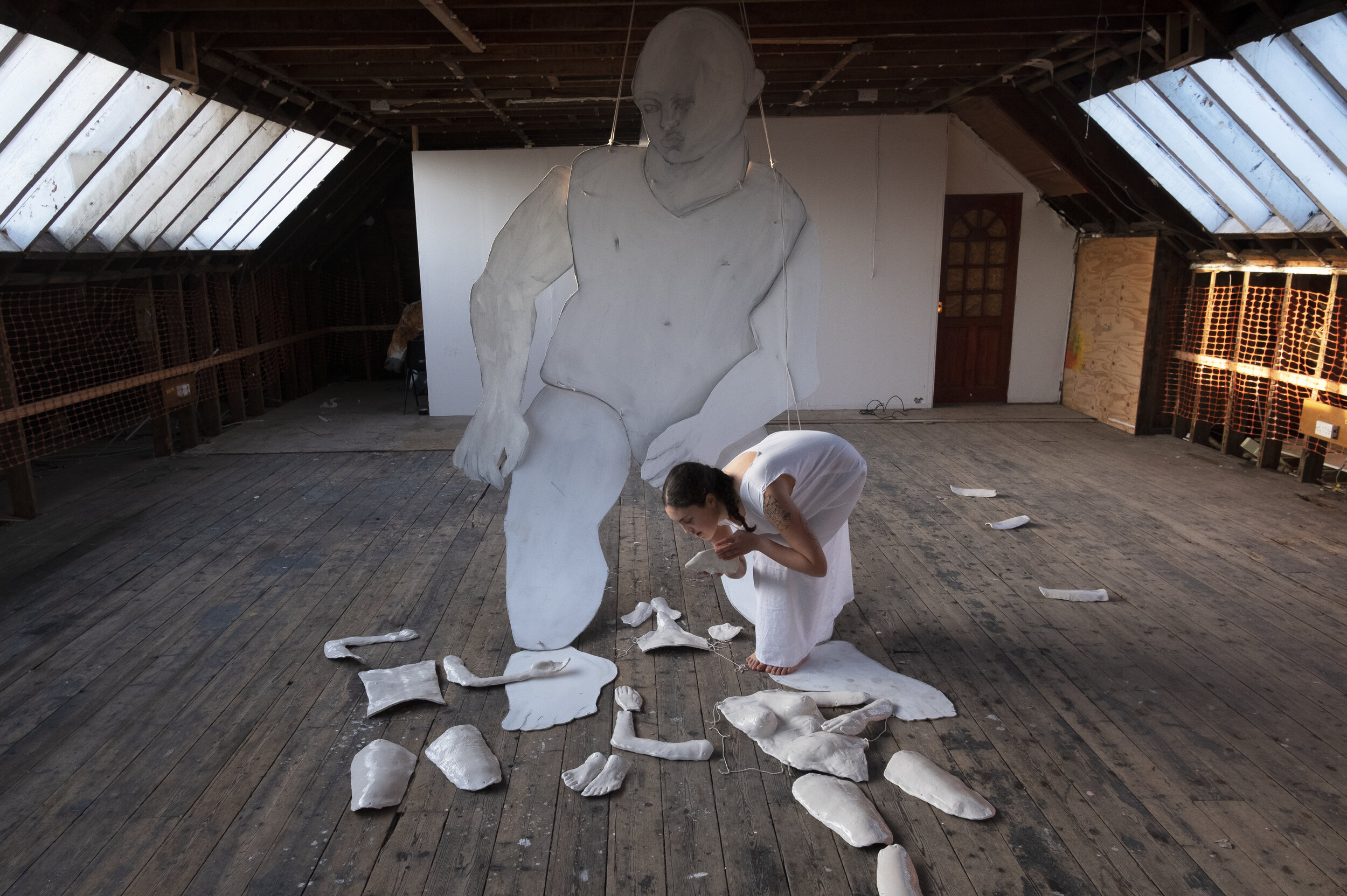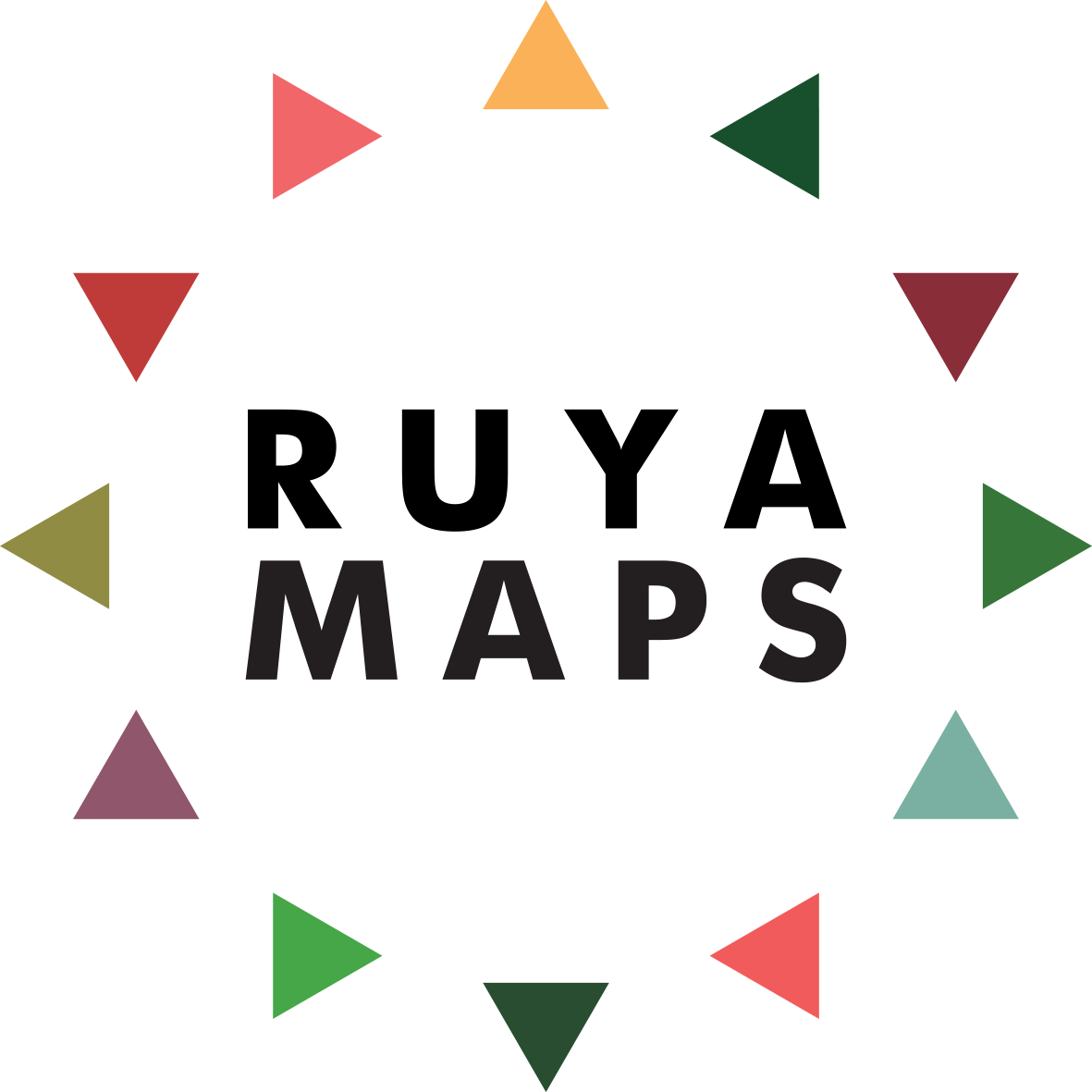Microcommission: ‘Cheimadia’ by Alkmini Gkousiari (Copy)

















Alkmini Gkousiari, Cheimadia, ceramic armour, performance and documentation, 2020
Commissioned by RUYA MAPS
In Cheimadia Alkmini Gkousiari proposes a piece of work that can be worn; as the artist carries Athens with her from afar she wished to make a piece that she could take with her in different locations that have glimpses of her city. She has said that the piece was made during the overwintering of 2020 as an attempt to remember and to identify with an identity that is drifting away.
“The final piece shows a body on a body, layer after layer like the city of Athens which has developed by being built on top of itself”
Detail of the artist’s performance.
The piece consists of an armour made out of clay that resembles an ancient perfume bottle in the form of a kneeling athlete, ca. 540 BCE, that was found in the ancient Agora of Athens. Gkousiari casted parts of her body and then made reliefs of them in clay before firing and glazing them. The ceramic parts could then be assembled like a costume by attaching them to the body with string. The work then came full cycle with the artist interacting with the armour by wearing it in a performance based on the sculpture of the kneeling athlete.
The resulting image series suggests a Greek sculpture out of place, that has been forgotten like the ruins that are present as you walk around the streets of Athens. The final piece shows a body on a body, layer after layer like the city of Athens which has developed by being built on top of itself. To the artist this process creates a feeling of ‘‘unspoken heaviness’’ that Cheimadia stands to document.
Alkmini Gkousiari has produced a text to accompany the piece which is available below in English and Greek:
‘‘Αυτό το έργο δημιουργήθηκε κατά τη διάρκεια του ξεχειμωνιάσματος σαν μια προσπάθεια να θυμηθώ, να ευθυγραμμιστώ με μια ταυτότητα που παρασύρεται μακριά μου.
Αυτές οι αναπαραστατικές στάσεις μιλάνε για:
Ανυψωτικές θέσεις
Στατικών,
ληθαργικών άκρων.
Μια ωδή στις
χειρονομίες που κανείς δεν ακολουθεί πια.
Για τα σώματα που καταλήγουν υλικό για νοσταλγία.
Κουρνιασμένη μέσα,
Ξεχνώ τις κινήσεις μου και προσπαθώ να τις βρω στην άπνοια.
Έχει περάσει πολύς καιρός από τότε που η Μέδουσα μας επισκέφτηκε.
Σχεδόν όλα έχουν μείνει μουχλιασμένα
και γεμάτα σκόνη από τότε που γεννήθηκα.
Αναρωτιέμαι αν γη τόσο ποτισμένη όσο η δική μας μπορεί να απαλλαχθεί από την
βαρύτητα που κουβαλάει.
Λήθη και λωτός,
Τρώω το φρούτο σε μια προσπάθεια να ξεχαστώ και να ξεχάσω.
Τί να κάμω?
Έχω ξεχάσει πως να προφέρω τους δρόμους και τα σοκάκια του τόπου μου.
Πώς να στριφογυρίσω την γλώσσα μου?
Αφουγκράζομαι.
Κάνω μικρές δρασκελιές.
Ένα βήμα από την Ακρόπολη και μετά πηδάω από τον Λόφο των Νυμφών στην
Αεροπαγήτου και έπειτα με χορευτικές κινήσεις προς του Φιλοπάππου ή όπως
κάποιοι τον αποκαλούν το λόφο των Μουσών.
Κάνω μια στάση στην άκρη του Λυκαβηττού και τελικά προσγειώνομαι στα
Τουρκοβούνια.
Κατρακυλάω και τους παίρνω όλους μαζί μου,
στην αρχαία αγορά, που πουλάνε ότι λαχταράει η καρδιά σου.
Στέκομαι εκεί μαζί σου.
Εσυ!
Ο καλύτερος
Ο πιό φοβερός από όλους.
Φαντασιώνομαι και εξιδανικεύω.
Και ξεκινάω ξανά,
Στους δρόμους με τις πολλές φλοίδες του χρόνου και τα αρχαία ονόματα,
με τις μυρωδιές σκουπιδιών και ξεπεσμένων μεγαλείων.
Και νέες μυρωδιές που έρχονται από μακριά και κατακάθονται ανάμεσα.
Και αυτοί που φωλιάζουν ανάμεσα στα διαμελισμένα τμήματα του σώματος της
πόλης και περιμένουν να λαδωθούν οι κλειδαριές.
Με τα άκρα τους ακινητοποιημένα στις ίδιες στάσεις για αιώνες.
Προσπαθώ να τα μαζέψω και να δω πια ταιριάζουν με τα δικά μου χαμένα.
Μύτες που σχηματίζουν μια ευθεία γραμμή από την βάση ως την άκρη.
Πόδια φωτιά.
Χάνω τον εαυτό μου στον λαβύρινθο του Δαίδαλου.
Κάθε στροφή και όνομα δρόμου εδώ έχει μια μακριά και ελικοειδή ιστορία που
έφτασε ως εδώ από μία ιστορία των ανθρώπων.
Την ιστορία των γιατί, των πώς, και των από που.
Όλα μαζί μια μπερδεμένη πρόταση.
Μήπως αυτές οι στάσεις του σώματός έχουν μεταβιβαστεί σε εμάς?
Τα σώματά μας, η σκάφη που τώρα κρατάει ότι έχει απομείνει.
Θυμάμαι όταν μου είπες πως σκάβεις την γη σου για το καλοκαίρι.
Και συνάντησες έναν τάφο, και χωρίς καμία σκέψη τον ξαναέθαψες.
Τον άφησες στην ησυχία του,
λίπασμα,
εξιλέωση.
Τώρα η συγκομιδή σου είναι καρποφόρα και ίσως όλο το φταίξιμο οφείλεται σε αυτό
που είναι από κάτω.
Κάθομαι σε αυτό το έδαφος,
με σταυρωμένα τα πόδια.
Απελπίζομαι.
Αυτή η γλώσσα που έδωσα στον εαυτό μου δεν μπορεί να εκφράσει αυτό και
περισσότερο,
ή λιγότερο.
Τιτανίδες,
αδελφές μου,
Αυτές βρίσκονται πιο μπροστά με τις ευθείες αυστηρές τους στάσεις.
Πετάω μαύρη πέτρα πίσω μου.
Παίρνω παξιμάδια για το ταξίδι, που κρατάνε πολύ.
Με το ένα χέρι βουτηγμένο στην ευτυχία και το άλλο ακόμα να αιωρείται.
Πλένω τα νυσταγμένα μου μάτια με κρασί και τα στεγνώνω με πρόσφορο.
Καβαλάω τον ταύρο χωρίς την άδεια του Δία.
Σε άλλους τόπους,
Λιγότερο γεμάτους.’’
‘‘This piece was made during the overwintering as an attempt to remember, to identify with an identity that is drifting away.
These performative moments are about;
lifting positions
of static,
lethargic limbs.
An ode to the
gestures that no one follows anymore.
Bodies only material for nostalgia.
Perched inside,
I forget my movements and try to find them in stillness.
It has been a long time since Medusa visited us.
Most things have stayed musty
and dusty since my birth.
I wonder if land as potent as ours can be emptied of its heaviness.
Lethe and lotus,
I eat the fruit in an attempt to be forgetful.
Τι να καμω?*
I have forgotten how to pronounce the streets and alleyways.
How to roll my tongue?
I eavesdrop.
I take small strides.
A step from Acropolis and then I jump, from the Hill of the Nymphs to Aeropagus
and then with dancily movements to Philopappou or as they call him the hill of
Mouson.
I make a stop on the tip of Lycabettus and then I finally land on Tourkovounia.
I tumble down and fall.
I take everyone with me.
By the ancient market, where they sell what your heart desires.
I stand there with you.
You, The greatest,
the best of all.
I fantasize, I idealize.
And I start again;
through the streets with the many layers and ancient names,
with the smells of garbage and fallen legacies.
And the new smells that come from far away and get stuck in between.
And the ones that nest amongst the dismembered body parts of the city and wait for
locks to be oiled.
With their limbs positioned the same for centuries.
I try to gather them and see which ones fit with my missing ones.
Noses that form a straight line from base to tip.
Fire feet.
I lose my way in Daedalus’ labyrinth.
Each turn and street name here has a long and winding story that comes along, a
story of people, of the whys and the hows and the where froms.
All together as a big long tangled sentence.
Could it be that these positions of theirs have passed down to us?
Our bodies now vessels that hold, what is left.
I remember when you told me how you dag your earth for the summer.
And you came across a tomb, and without any thought you buried it again.
Left it at piece,
fertilizer,
atonement.
Now your harvest is fruitful and maybe what is underneath is to blame.
I sit on this ground,
crossed legged.
I get desperate.
This language I gave to myself can not express this and more,
or less.
Titanides,
my sisters,
Are further ahead with their straight, strict postures.
I throw a black stone behind me.
I take παξιμάδια** for the journey, they last long after all.
With one hand dipped in happiness and the other still hovering.
I wash my sleepy eyes with wine and dry them with πρόσφορο***.
I ride the bull without Zeus’s permission.
To other lands,
less full.’’
Notes:
* Τι να κάμω: Tι να κάνω means ‘what do I do?’ but in this case is spelled with a dialect from central Greece.
** παξιμάδια: paximathia, paximadia (plural), or paximadi/paximathi (singular), is a hard bread of Greek origin, similar to rusk, that is prepared with whole wheat, chick pea or barley flour.
***πρόσφορο: prosforo, pronounced PROHS-foh-roh, means ‘offering’ and is made by members of the Greek Orthodox faith as altar bread for celebrations of the Divine Liturgy.
Announcing the finalists of our open call for Athenian artists, we introduce Alkmini Gkousiari, Iliodora Margellos and Melina Fakitsa Mosland. We share their statements on their relationships with the city; reading each one reveals an Athens that is stubborn, vibrant, chaotic, a city that inspires you and leaves you wanting,
Q&A with Glasgow based artist Alkmini Gkousiari, one of the finalists of our open call for ‘Spirit.’ Read on to find out Alkmini’s take on mythology, urban planning in Athens, and the feeling of being a visitor in your hometown.



